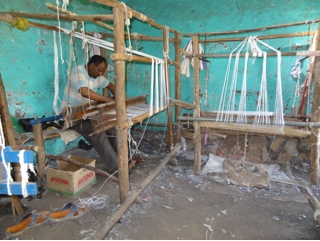Here in Gondar, we are volunteering at an after school program sponsored by Meketa, an organization based in the UK. Children in grades 3 through 7 go to public school half day, so those who attend school in the morning come to the after school program in the afternoon, and students who have school in the afternoon attend in the morning. The purpose of the program is to supplement the public school curriculum. For the most part we have been assisting with English language instruction. The other text books are in Amharic, so teaching those topics would be a challenge for us.
Meketa, in conjunction with government programs, also offers micro loans to people in the Jewish community. Yesterday, a staff person took us to visit four people who have received micro loans.
Ferede buys beans and wheat in large quantities from the regional marketplace. Then, he sells them in a small neighborhood market for a profit. He borrowed 10,000 birr (500 USD) which he must repay in two years. His monthly payment is 417 birr.
Genet bakes rolls six days per week, because she does not bake on Shabbat. The rolls, made of black wheat and corn, are eaten for breakfast. Sometimes she also bakes injera. When we met Genet, she had just returned from the market 30 minutes away. She went to buy more flour, but returned empty handed because there was no flour available. If she is not able to buy more flour she will not be able to bake the next day. Genet supports a family of 8 people: her husband, 5 children, and an aunt who is ill.
The entry to Genet's house.
Kassaw sells local brands of beer and homemade beer from his house. He has an area in front of his house with benches where customers can sit, drink beer, and eat a traditional bread made of corn and wheat. The bread is round and flat like injera, but made with different ingredients. Kassaw told us that his house is not a good place to sell beer, because he is not located in the market or on a often-traveled path. However, government regulations prevent him from re-locating.
Kassaw, his wife and baby in their mud hut.
Kassaw's beer making apparatus.
Fresh bread is cooling near the benches on which
customers sit to drink beer in front of Kassaw's house.
Fenta has a small shop on a main road that she runs with her daughter. They sell a limited inventory of cleaning and food items. There is also an open space in front of her shop for serving tea and bread.
Fenta's shop and the neighboring shops.
Fenta, her daughter, and the Meketa staff person.
Fenta has an interesting story. She left her rural village about 17 years ago and moved to Gondar in order to register for aliya to Israel. She had a farm in her village and was able to live a comfortably there. Unfortunately, most of the people in Fenta's family left for Israel shortly after she arrived in Gondar, but she was not able to go for reasons that I do not understand. For all these years, Fenta, her two daugthers and 2 grandchildren have been waiting to go to Israel. Because of her farming background, she doesn't have and has not been able to develop good business skills. Consequently, her small shop does not do very well and she has trouble supporting her family. By coincidence, I ended up sitting in the same row as Fenta at the Kabbalat service at the synagogue the next evening. She greeted me as she might an old friend!

















































